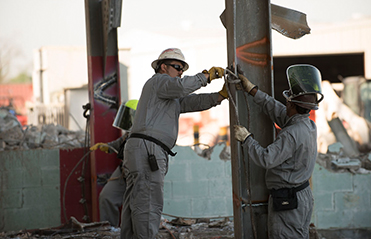
Work Planning Phases:
Once a client issues a work order, service contract, or notice to proceed, LCDC begins the project planning phase. We go through the following procedures, which parallel the client’s requirements and preferences. Since demolition is a process of strategy and technique, we implement each stage with the utmost care. The Project Manager and Superintendent must become familiar with all aspects of the project, as well as any and all safety precautions that will be required.
Pre-mobilization –The following tasks are initiated prior to the mobilization of personnel and equipment to the job site:
Submittals – All client-required documents, such as insurance certificates, permits, and licenses, shall be submitted prior to arrival on site or upon request.
Support Services – Necessary support services shall be determined and established. The procurement of necessary materials and supplies is also done at this time. Typically required support services include:
Initial Site Set-Up – Once the project start date has been determined, initial site setup and other events are set in motion, including the following processes:
Mobilization – Personnel and equipment preparation for transport to the designated job site is initiated, including arranging for an office, tool trailers, equipment, and supplies scheduled for delivery to the site; hiring of local personnel (if required) is also done at this time.
Work Preparations – Initial work preparations begin at this point and include the following tasks:
Work Scheduling and Training – Projected work plans are completed at this point and are communicated to the appropriate personnel. The work plan, as determined from the clients’ work scope and schedule, shall follow an anticipated sequence of events.
Based upon the project’s scheduled tasks, employees shall receive the appropriate additional training in hazard recognition and prevention as it applies to the intended work activities at the site. Any additional training deemed appropriate by project management and safety personnel shall be incorporated into the site training.
Work Plan Methodology – The work plan shall include information from site observations, safety and health surveys, and hazard assessments performed at the site by the LCDC project management, engineers, and safety personnel.
Demolition Safety
At LCDC, we always put our team’s and our client’s safety first. That is why all project planning and execution phases must be exactly as outlined in order to ensure task instructions are communicated clearly to all personnel involved in the project. At LCDC, safety is never an option.
Environmental remediation deals with the removal of pollution or contaminants from environmental media such as soil, groundwater, sediment, or surface water.
May it be the purchase and relocation of a process unit, or complete facility, the demolition and dismantling must be very precise to the detail. Buildings for the industrial sector are usually unique cacies.
The demolition industry is making way for a better world, helping communities re-invent and re-imagine their future and the National Demolition Association is here to provide support.
The physical assets of any large organization (from manufacturing and office equipment to entire buildings) wear out or are no longer needed where they were originally put into service.
Plant dismantling is a crucial process that involves the recycling of scrap materials such as metal and the process of reusing assets as well. It is not an easy process and they can be costly.